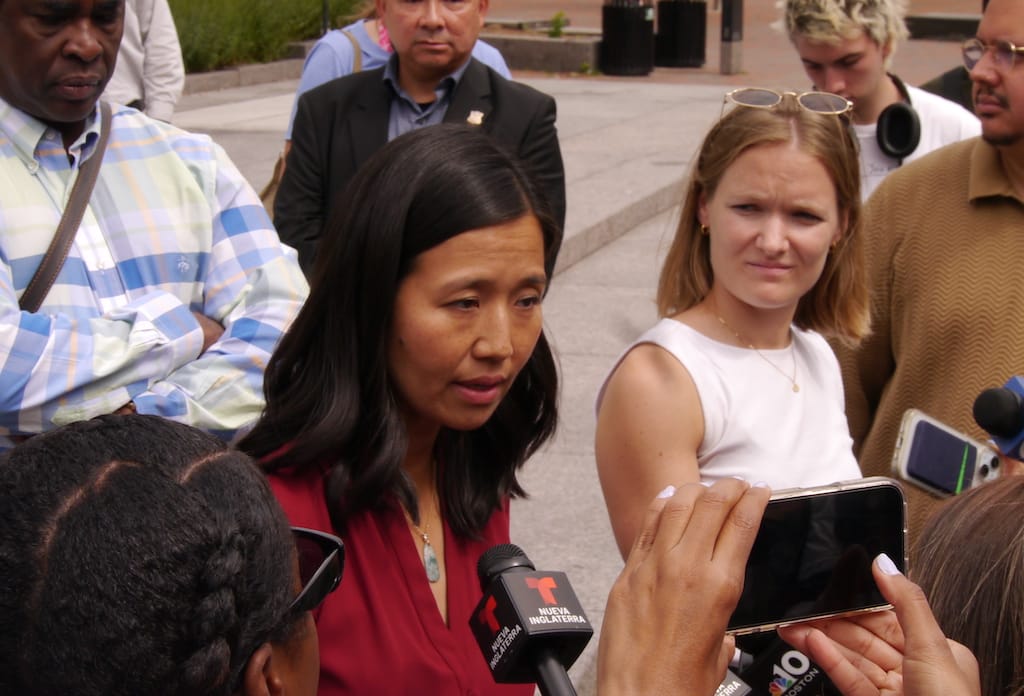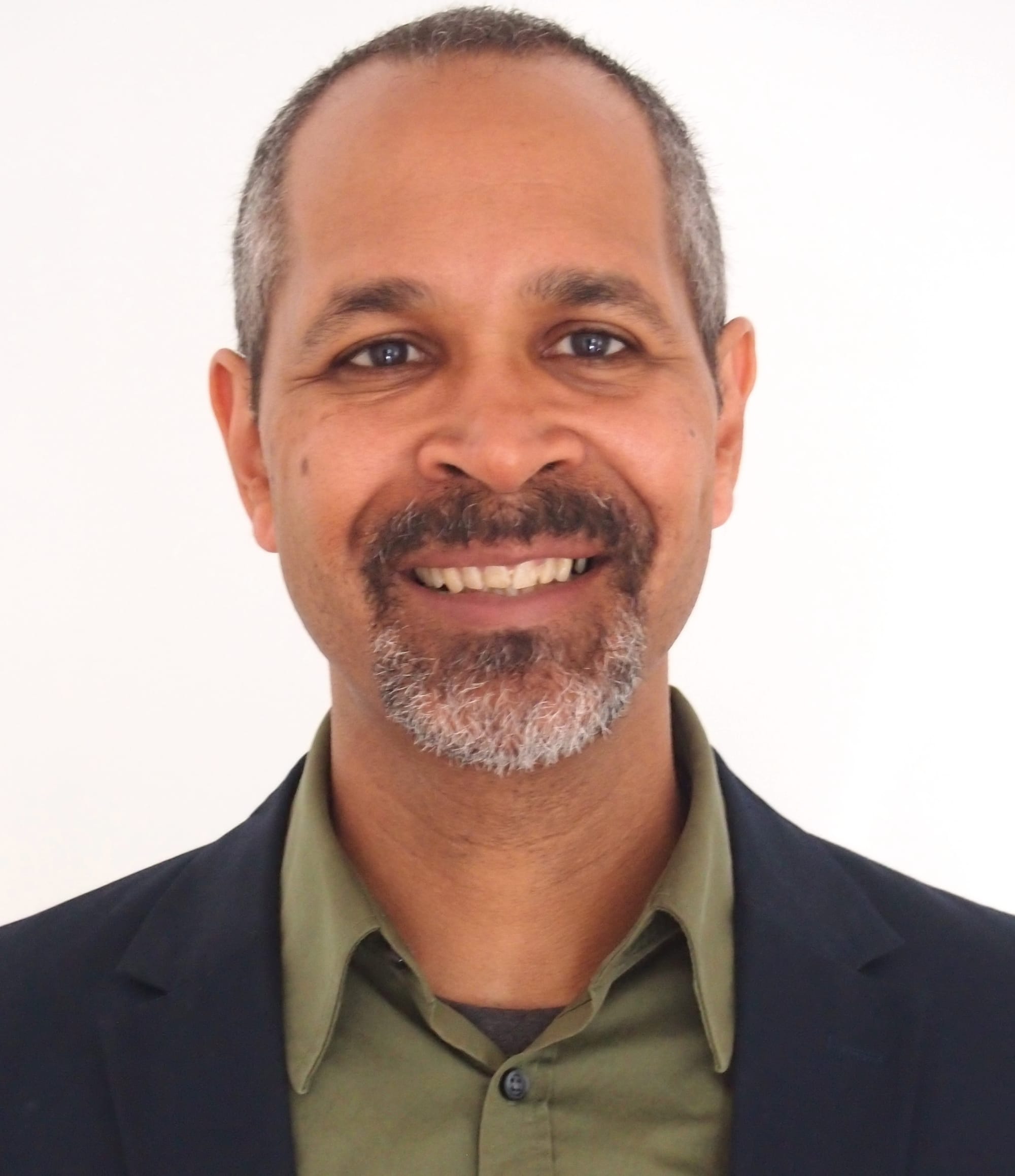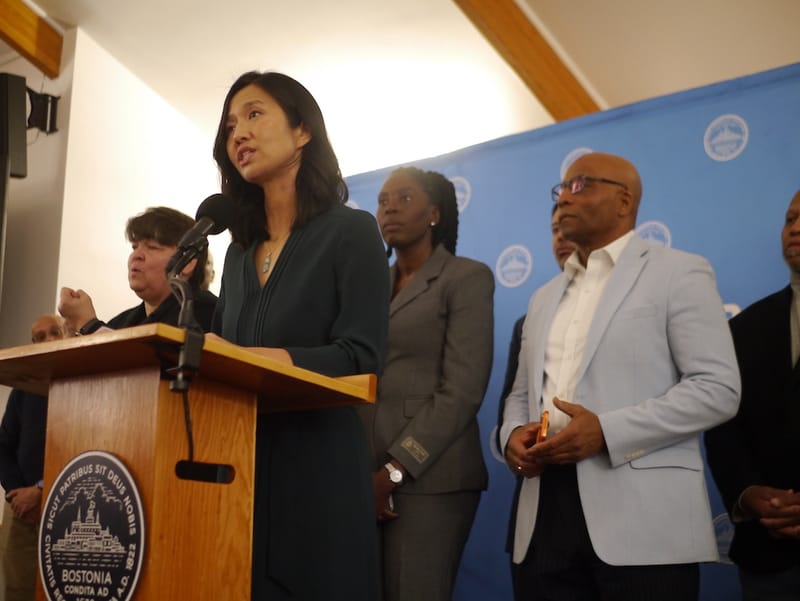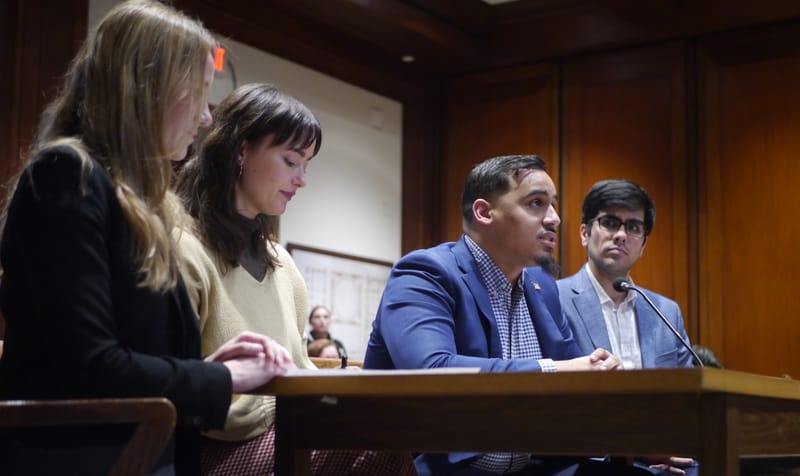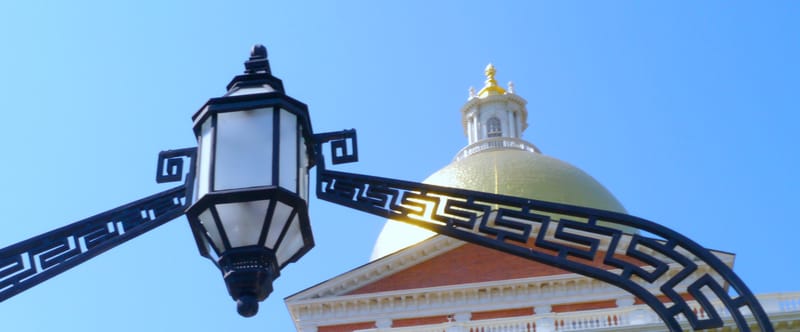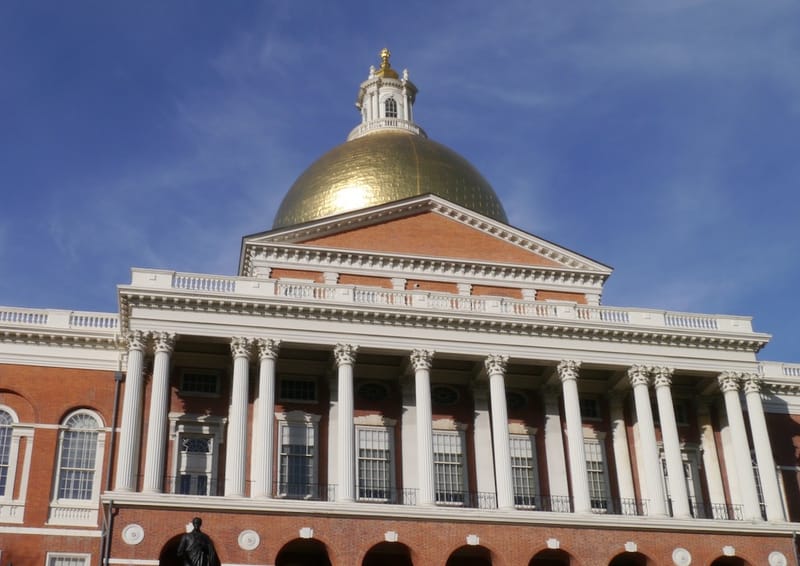On the campaign trail, Wu's supporters and critics say the city isn't listening
In light of her popularity across the city, the assessment among political friends and foes alike that Mayor Michelle Wu's administration isn’t listening to residents is remarkable.
When asked by The Dorchester Reporter before the preliminary election to grade Mayor Wu’s administration, at-large City Council candidate Alexandra Valdez, who directs the city’s Office of Cultural Affairs, gave it a B-minus, citing “significant challenges” in community engagement, among other areas. At-large candidate Will Onuoha, executive director of the Mayor’s Office for Fair Housing, gave a similar assessment in the survey, which was co-sponsored by the Boston Municipal Research Bureau.
“One common concern I hear is that residents do not feel like they have a voice or are part of the decision making that happens at City Hall,” Onuoha wrote in response to the questionnaire, published Aug. 20.
These responses from two candidates who work under Wu at City Hall mirrored those at-large candidates gave in a June forum held by the Ward 4 Democratic Committee, during which they were asked to grade the city on officials’ “approach to engaging the voices of diverse residents.”
Three candidates gave the administration a C grade and three a C-minus. At-large Councillor Ruthzee Louijeune gave it a B-minus, and at-large Councillor Julia Mejia registered an “incomplete” on her response.
Said at-large candidate Frank Baker, a former District 3 councillor: “It’s about listening to people. I go to White Stadium meetings, I go to Blue Hill Avenue meetings, the transportation plan. People don’t want it. And they’re saying they’re not being listened to.”
While Baker had an established record of opposing the Wu administration’s initiatives when he represented District 3, others who are critiquing her administration’s willingness to listen to Boston residents include her allies: at-large Councilor Henry Santana, a former Wu employee for whom the mayor helped collect nomination signatures in May, gave her team a C-minus, and Valdez has received campaign contributions from high-ranking members of the Wu administration.
Wu is now poised to win re-election with no opposition after Josh Kraft dropped out of the race following the preliminary in which he won just 23 percent of the vote. In light of her popularity across the city, the assessment among political friends and foes alike that her administration isn’t listening to residents is remarkable.
The at-large candidates haven’t been the only ones critiquing the Wu administration’s openness to community input. Messaging around the phrase that Michelle Wu “doesn’t listen to Bostonian’s concerns” appeared in polls of registered voters and in communications from the Kraft campaign.
In an interview on Sept. 9, Wu acknowledged her administration has room for improvement.
“We always strive to do better,” she said. “You know, I would hope that many of our residents know these longstanding challenges didn’t happen overnight. We’re working as hard and as fast as we can, but they won’t get solved overnight, either. And so, it is a process. We are incomplete in terms of the grade so far, because there’s more work to be done, but we’ve laid a very strong foundation and are making huge steps forward on many of these issues.”
The candidates’ concerns echo those of leaders of civic groups and neighborhood associations across the city – that Wu and her administration are often more concerned with getting projects done than in getting them done with neighborhood input. From the administration’s more controversial moves, such as its aborted attempt to relocate the O’Bryant High School to West Roxbury, to the inner workings of the city’s planning processes, neighborhood activists say they’re often shut out when decisions are being made.
In Boston’s Black community, the city’s plan to lease White Stadium to a professional women’s soccer team, the Blue Hill Avenue redesign effort, and the O’Bryant move have more than any other projects generated friction and charges that the mayor is making major decisions without regard for the wishes of the communities she serves.
Citywide, neighborhood activists have raised alarms about the administration’s proposed changes to the Article 80 development review process that, critics say, would lessen the input of neighborhood civic groups and also to Wu’s restructuring of the Boston Planning and Development Agency, which, critics argue, concentrated decision-making power over development planning in City Hall. The latter has been seen as a far cry from Wu’s campaign pledge to dismantle the former Boston Redevelopment Authority by separating its planning functions from its development duties.
“The changes that have been introduced have reinforced all the bad things that led the Boston Redevelopment Authority to become one of the most hated agencies in the commonwealth,” said Martyn Roetter, who is chair of the Neighborhood Association of Back Bay.
The city’s decision to lease White Stadium to Boston Unity Soccer Partners sheds some light on the speed with which the Wu administration has pursued its development goals. City officials met with team representatives for months before they issued a request for proposals (RFP) but they did not meet with or inform neighborhood residents of any plans to redevelop the stadium until the RFP was released in April of 2023.
“We know the RFP was done behind closed doors,” said Rodney Singleton, who sits on a project review committee for the stadium redevelopment. “The community was never asked whether they wanted White Stadium to be shared with a private entity.”
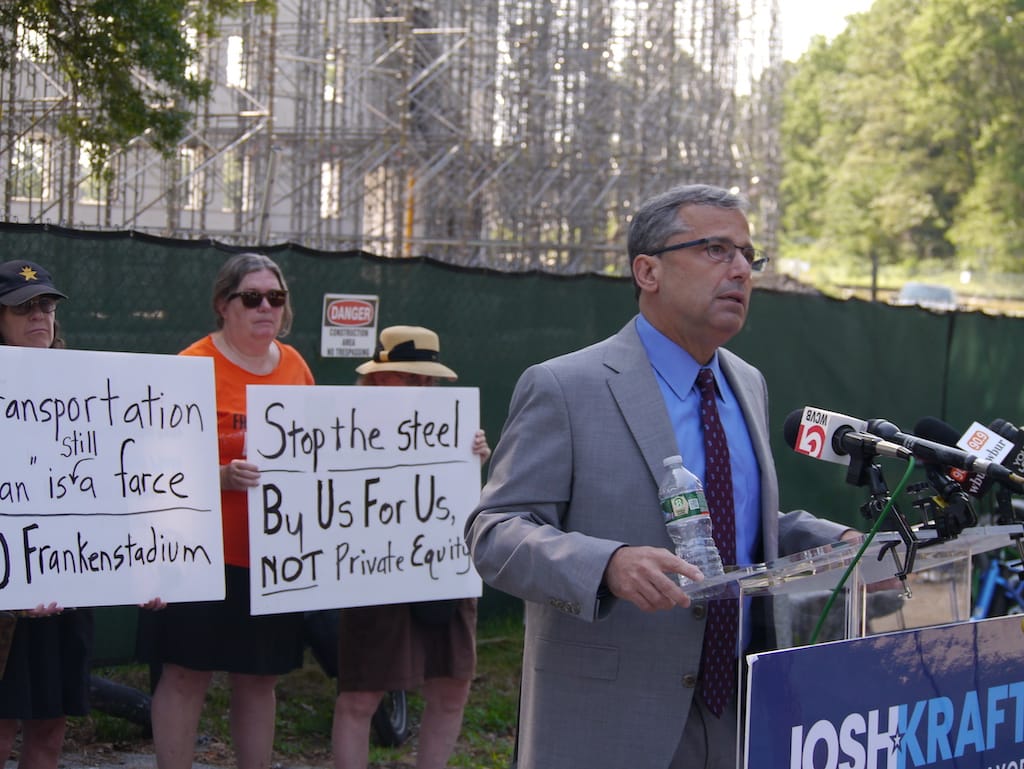
During the mayoral administration of the late Thomas Menino, neighborhood activists working on the Roxbury Strategic Master Plan pressed for – and got – the community’s right to weigh in on requests for proposals before the city drafted them. That level of community engagement has become an expectation for many in Boston. During a July 24 hearing of the City Council’s Committee on Post-Audit: Government Accountability, Transparency and Accessibility, Julia Mejia questioned the absence of community input into the RFP.
“Normally when there’s going to be something that’s put out to bid, there is some sort of community engagement, input and process, especially when there’s public land and we’re using taxpayer dollars,” Mejia said.
In his response, Segun Idowu, the city’s chief of Economic Opportunity and Inclusion, said, “My understanding of generally the process is that there’s no particular engagement in shaping [of an RFP] unless it’s affirmatively or pro-actively done, but that the process itself of shaping an RFP only requires the department to put an RFP together.”
For her part, Wu called the process thorough.
“I’ve been in city government for almost 15 years now, and this project has been the project that I’ve seen with the most opportunities for public feedback, the most changes that have been incorporated from that public feedback,” she said on Sept. 9.
“Two years of process, more than five dozen meetings, almost a thousand comment letters received, and at some point,” she said, “we have to decide if we’re going to keep kicking the can down the road or take all of that feedback in and find a way to move forward.”
The Blue Hill Avenue reconstruction project has sparked a similar level of community controversy, with draft plans from the city showing center-running bus lanes, auto travel lanes reduced from three to one in some stretches, and bike lanes and curb bump outs restricting on-street parking, in all, a development that has many worried.
In a June 10 statement on the city’s Blue Hill Avenue transportation planning process, the Greater Mattapan Neighborhood Council called on the administration to “restore trust by honoring past promises and creating accountable, transparent channels for community oversight. Over the years, we’ve seen plans arrive with great fanfare — promising transformation, progress, and equity, “the statement read. “But these promises must now be delivered with substance, with clarity, and with deep, consistent engagement.”
State Rep. Russell Holmes, who supports the planned renovations to Blue Hill Avenue, countered arguments that the Wu administration is ignoring local residents. “I think she is listening,” he said. “There is a group of people who are angry because they don’t want the changes.”
The projects that the Wu administration has taken on are ambitious and often controversial. Bike lanes have enthusiastic supporters and vehement opponents. But the controversy around how the administration arrives at decisions — where to place bike lanes, when to remove them — often generate as much controversy as the decisions themselves.
Article 80 reform — Wu’s bid to change the way the city and neighborhood residents review and approve large-scale development projects — stalled in the State House after a process that many said eliminated neighborhood voices.
“Candidate Wu campaigned as a reformer, vowing to dismantle the Boston Planning & Development Agency (BPDA), elevate community voices, and make development work for Boston’s people,” wrote Boston resident Mark Gallagher in a February letter on the BPDA’s comment section on the Article 80 review process. “Your proposed Article 80 reforms strip neighborhoods of their power, expand the authority of an unaccountable agency, and pave the way for displacement under the guise of ‘streamlining.’”
With Kraft’s exit from the general election race, opposition inside City Hall to Wu’s policies is likely to be confined to those councillors who have pushed back on her White Stadium plans: District 2 Councillor Ed Flynn and at-large councillors Julia Mejia and Erin Murphy.
Speaking to reporters on Sept. 9, Wu noted that she has listened to criticism of her administration and has taken it to heart. “I welcome and appreciate the feedback and accountability and dialogue,” she said. “We hope that everyone participates every step along the way, not just when they’re trying to get votes.”
This article originally appeared in the Dorchester Reporter.


